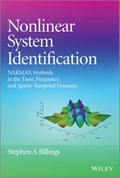Nonlinear System Identification
NARMAX Methods in the Time, Frequency, and Spatio-Temporal Domains
Stephen A. Billings
Nonlinear System Identification: NARMAX Methods in the Time, Frequency, and Spatio-Temporal Domains describes a comprehensive framework for the identification and analysis of nonlinear dynamic systems in the time, frequency, and spatio-temporal domains. This book is written with an emphasis on making the algorithms accessible so that they can be applied and used in practice.
Includes coverage of:
The NARMAX (nonlinear autoregressive moving average with exogenous inputs) model
The orthogonal least squares algorithm that allows models to be built term by term where the error reduction ratio reveals the percentage contribution of each model term
Statistical and qualitative model validation methods that can be applied to any model class
Generalised frequency response functions which provide significant insight into nonlinear behaviours
A completely new class of filters that can move, split, spread, and focus energy
The response spectrum map and the study of sub harmonic and severely nonlinear systems
Algorithms that can track rapid time variation in both linear and nonlinear systems
The important class of spatio-temporal systems that evolve over both space and time
Many case study examples from modelling space weather, through identification of a model of the visual processing system of fruit flies, to tracking causality in EEG data are all included
to demonstrate how easily the methods can be applied in practice and to show the insight that the algorithms reveal even for complex systems
NARMAX algorithms provide a fundamentally different approach to nonlinear system identification and signal processing for nonlinear systems. NARMAX methods provide models that are transparent, which can easily be analysed, and which can be used to solve real problems.
This book is intended for graduates, postgraduates and researchers in the sciences and engineering, and also for users from other fields who have collected data and who wish to identify models to help to understand the dynamics of their systems.

